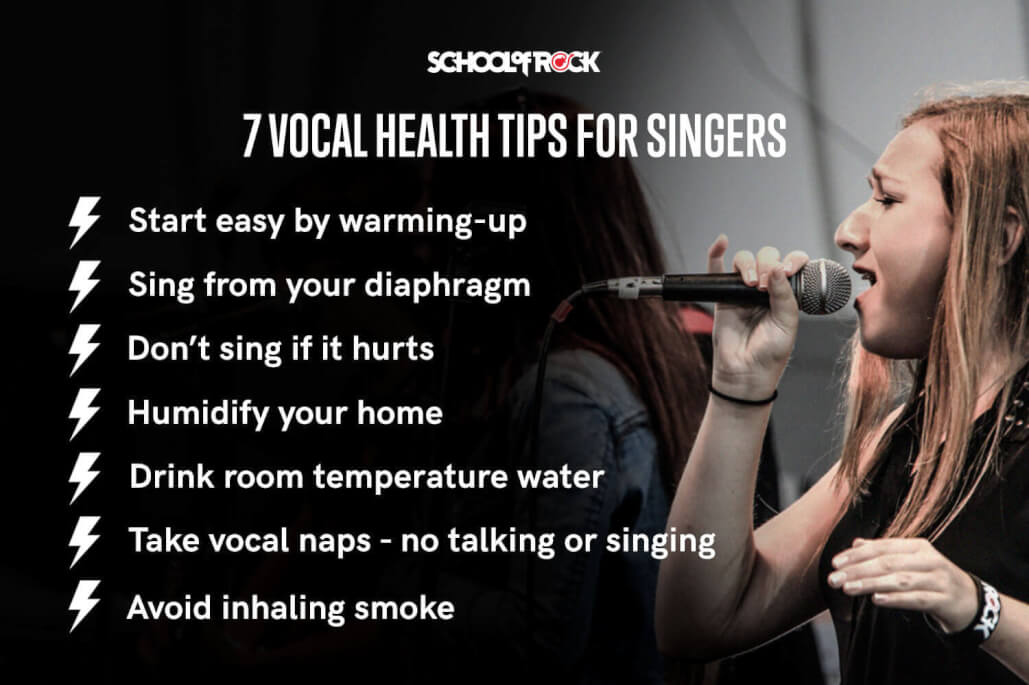If you are a singer—whether in a choir or in a rock band, onstage or in the shower—you should know how to keep your singing voice healthy. After all, the state of your vocal health can either make or break your performance. Thankfully, vocal health for singers isn’t all that complicated. Some common sense and a little insider knowledge on vocal-health tips will do the trick, so you can sing your heart out.
What are vocal cords?
Vocal cords, also called vocal folds, are two triangular bands of tissue that sit at the top of your windpipe. They’re open while you’re breathing, and when you speak or sing, they close, pulling tighter for higher notes, remaining loose for lower notes. You want your vocal cords soft, smooth, flexible and free of inflammation.
Can you damage your vocal cords?
Allergies, smoke (first- and secondhand), tension, overuse, and abuse (like screaming) are all potentially damaging to your voice. Irritated or inflamed vocal cords won’t close efficiently, preventing you from hitting the higher notes in your range and producing a rougher, more breathy sound no matter what note you’re singing.
You might like a breathy sound, and that’s great, but that should be your choice. Keep your voice flexible and healthy, and you’ll be able to sing in whatever style you choose.
"...if you want a career as a singer, your vocal health should be your number one priority."
Why Healthy Vocal Cords Are Important for Your Singing
As a singer, your vocal cords are your instrument. You’d never paddle a canoe with a cello or use a flute to hit a golf ball. Likewise, you should never abuse your voice. Healthy vocal cords will allow you to exercise your full range and produce a full, pure, tuneful sound. And even if you’re more Iron Maiden than Iolanthe, if you want a career as a singer, your vocal health should be your number one priority.

7 Tips on How to Keep Your Singing Voice Healthy
Here are seven suggestions for ways to maintain vocal health for singers.
1. Warm-up—and cool down
It is vital that you warm up your voice before singing, and there are a variety of exercises to suit all ages, vocal ranges, and levels of experience. Always ease into your exercises by first warming up your facial muscles—loosen your lips and jaw muscles by blowing through your lips, sticking out your tongue as far as it will go, massaging your face, and sighing musically.
Don’t be afraid to make some noise as your warm-up. Let your voice wander up and down its range. Then move on to humming, or perhaps do some gentle lip rolls or tongue trills. Only once you feel like your face, mouth, and voice are loosening should you start singing actual notes. The whole process should take between 10 and 20 minutes (and don’t skimp.).
After your lesson, audition or performance is over, take time to cool down. While cooling down is often omitted from lists of vocal-health tips, it’s a really simple way to support vocal health for singers. Sigh on a descending note. Yawn, raising your soft palate and releasing any built-up tension. Do some gentle lip rolls, again allowing your voice to gently descend. Take 5 or 10 minutes to allow your voice to settle back into its normal speaking range.
2. Hydrate your voice
If you’re wondering what to drink to sing better, the answer is simple: water. Water is one of the best drinks for your singing voice, with herbal teas (but not too hot) in second place. Drink water throughout the day, and keep a water bottle nearby during lessons and rehearsals. And don’t think that a swig or two of water while you’re warming up is enough. Your vocal folds work best when they’re well lubricated, and that means keeping your entire body hydrated.
There’s no way to directly moisten dry vocal cords. Nothing you drink or spray or dissolve in your mouth passes directly over your vocal folds. Your larynx is separate from your esophagus (and it’s a good thing too, or we’d always be choking). But dry vocal cords quickly become irritated vocal cords, and that’s how you harm your voice. The more water you drink, the better your voice will be.
3. Humidify your home
A better question than what to drink to sing better is what to breathe to sing better. Although nothing you drink can directly moisturize your vocal cords, you can give your voice a boost by breathing properly humidified air. Overly dry air is very taxing on your breathing and your voice.
Consider humidifying your home, especially when you’re working on a particular production or if you’re doing a series of concerts. Using a humidifier can support your respiratory health while also preventing dry vocal cords.
4. Take vocal naps
If you work out, you know how important rest days are. A tired voice, just like a tired body, is more prone to injury. If you’re sick, if your allergies are flaring up, or even if you’ve just been working your voice a lot (like in rehearsal or when you’re preparing for an audition), take time to rest your voice.
That means no talking, no singing, and definitely no whispering, which is terrible for your vocal cords. A tired voice needs time to regenerate, so the longer you rest it, the better. Vocal rest gives your delicate vocal folds time to recuperate and heal.
5. Avoid harmful substances
Smoking (or vaping) anything is absolutely the best and quickest way to permanently ruin your voice. Don’t do it. When you inhale smoke, you’re essentially bathing your vocal cords in toxins. Everything you breathe in—every pollutant, every speck of pollen, every particle of dust—passes right over your vocal cords, drying them out and irritating them.
Alcohol might not have such an immediately damaging effect, but it is dehydrating and inflammatory. And the high sugar content of most mixers is also bad for your voice. If your vocal health is important to you, revisit tip #2 for suggestions on what to drink to sing better.
6. Don't sing from your throat
Despite all this talk about healthy vocal cords, your vocal folds are only one part of a complex system that produces your singing voice. To sing well and maintain your vocal health, you need to understand your body and know where your voice is coming from. You should never sing from your throat—the power behind your voice is your breath, and your breath should be supported by your diaphragm. Sing from your core, allow your vocal cords to relax, and let your voice resonate in your chest, pharynx, and face.
Don’t worry if this doesn’t immediately make sense to you. It takes time to train your body to support your voice, though you can speed up the process by working with a vocal coach.
7. Don't sing if it hurts
We feel pain for one simple reason—it’s our body’s way of telling us to STOP. If your throat hurts, if you have an infection of any kind, or if you’ve strained your voice through overuse, don’t sing. Put yourself on vocal rest. Drink a lot of water. Get some extra sleep. Take care of yourself and your tired voice. But most importantly, do not push through the pain. You can seriously damage your voice by singing when your voice is strained or your throat is hurting.
"Take care of ... your tired voice. But most importantly, do not push through the pain."
Singing Summer Camps
Offered throughout the summer season, our music camps teach students how to play their favorite songs as part of a band. With workshops ranging from songwriting to performing onstage, our summer singing camps are perfect for students of all skill levels.
Check out Summer CampsFrequently Asked Questions about Vocal Health
Whether you’re wondering about dietary choices and the best drinks for your singing voice or are concerned about vocal strain, we’ve got you covered.
What should you eat for Vocal Health?
Vocal health is important and a healthy diet can improve every aspect of your life—including your voice. And a healthy diet is a balanced diet: lots of fruits and vegetables, whole grains, and lean proteins. These will give you energy and stamina, both of which singers need. You might want to avoid dairy products because they can thicken mucus, which can clog you up.
Eat lightly before an audition or performance. You need the energy, but an overly full stomach can press upon your diaphragm, making it harder to take a really deep breath, and that naturally gets in the way of your voice.
What are the best drinks to Improve Vocal Health?
If you're wondering how to improve your vocal health, the best drinks for your singing voice are water (especially room-temperature water, perhaps with a squeeze or two of lemon) and tea, but be careful about consuming too much caffeine, which can dehydrate you. You can find wonderful herbal teas designed for singers.
While it’s true that nothing you drink directly affects your vocal cords, herbs like slippery elm, peppermint, and licorice root are excellent for reducing inflammation and cutting through mucus generally. If you have too much phlegm in your throat, you’ll be tempted to clear it with a little rasping cough, and that is especially hard on your vocal cords.
What are the symptoms of strained vocal cords?
If you’ve been singing a lot, you may feel a slight pinching sensation at the back of your throat. That’s vocal strain, and it’s nothing to worry about—except if you keep on singing. As soon as you feel pain, back off. Hoarseness and scratchiness are warning signs that your voice is tired and you need to give it a rest.
If you continue to push, you might start missing notes, and that should definitely make you stop. A little time and TLC are all you need to recover from strained vocal cords.
Sing in real performances onstage
Our music programs are taught by practicing musicians with the experience you need to learn to play. Perform live shows and develop your skills in a supportive learning environment for all skill levels.
See all music programsHow to Maintain Vocal Health
There are several ways you can improve and strengthen your singing voice, but the single best and most productive way is with singing lessons taught by voice instructors. Your voice is unique, and while online advice and videos can definitely help, they’re no substitute for a trained voice coach who can adjust your technique as you go and can teach you exactly those exercises that will do you the most good.
A vocal coach can help you define your range, teach you to smooth out your bridge, and help keep your voice as healthy as possible.
We hope you found this list of seven handy vocal health tips useful. As singers ourselves, we know that these are all tried and true methods of maintaining vocal health for singers. And healthy voices are beautiful voices.






